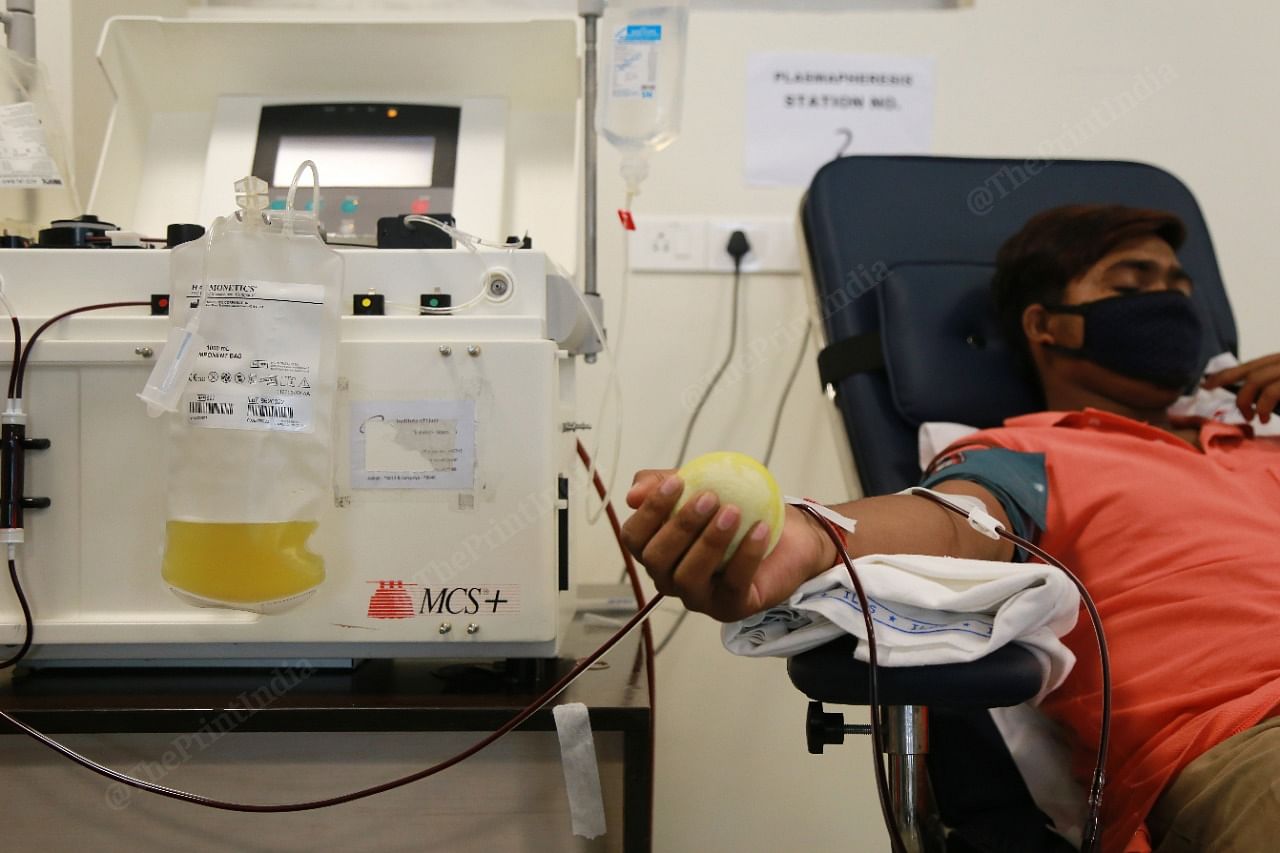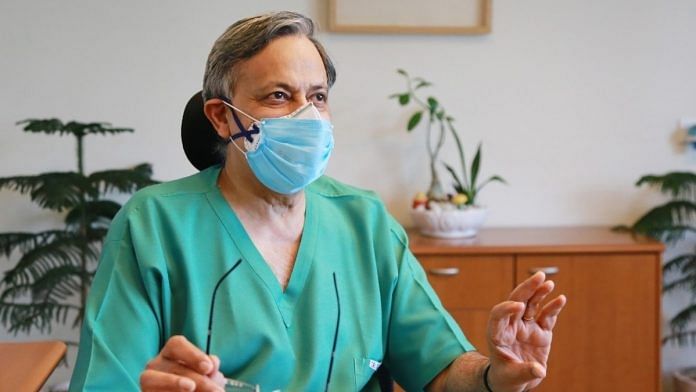New Delhi: Social indiscipline, rapid antigen tests, untraceable positive cases and a possible mutation in the novel coronavirus are some of the factors behind the resurgence of Covid-19 cases in the national capital, said Dr S.K. Sarin, the chief of the Delhi government-constituted expert panel on Covid.
In an exclusive interview to ThePrint, Sarin said the surge should be “seen as a serious wake-up call”, adding that Delhi needs a bottom-up approach, and less reliance on the government to ensure social distancing, or else the surge will continue to be a worrying trend.
“If we reach 2,000 cases per day once again, it will be worrisome,” said Sarin, who is the director of Institute of Liver and Biliary Sciences (ILBS), and a Padma Bhushan awardee.
On Friday, Delhi reported 1,808 Covid cases and 20 deaths. This came on the back of cases going past the 1,500-mark for the first time in over a month Tuesday. The daily tally has been rising since. The city has now recorded a total of 1.69 lakh cases and 4,389 deaths.
“The virus is very smart. It has outsmarted us and the increase in numbers is a cause of concern,” he told ThePrint.
In a wide-ranging conversation, Sarin spoke about how the virus is spreading again, the RT-PCR vs rapid antigen test issue, and the capability to double testing. He defended the data accuracy, and also stressed the need to hold NEET and JEE exams.
Also read: 21.9% of total Covid cases active, deaths cross 1,000 for a 3rd day, positivity climbs to 8.5%
On caseload and Delhi indiscipline
According to Sarin, the caseload rise owes to strict contact-tracing, increased testing, low specificity in rapid antigen tests, some positives not being detected, social indiscipline in the city, and a possible new mutation that may have come from outside.
He also noted that hospitals have been doing only one negative test before discharging a Covid patient. “It is possible that one negative test was done by rapid antigen but the person continued to have a positive virus and returned home, in turn, spreading the infection,” he said.
“We also need to understand if the cases are coming from a community and this could help us understand as we might be infecting people unknowingly… and that is evident when we see the number of people who are antibody-positive,” he said.
Referring to the latest sero survey results that showed 29.1 per cent seroprevalence in Delhi, Sarin said there was a rise of nearly 6 per cent from the previous survey.
Speaking about the indiscipline in the city, Sarin described persons who are not adhering to the Covid guidelines as anti-social elements. He referred to the Spanish flu pandemic in 1918, highlighting that everyone, whether in Massachusetts or Boston, was seen wearing masks. He added that it was crucial to police oneself, one’s area and colony.
Also read: HCQ reduces death risk upto 30% in hospitalised Covid patients, says new study
On RT-PCR and antigen tests, and increase in testing
Talking about the variation in results of rapid antigen tests and RT-PCR tests, Sarin said it has possibly contributed to the latest surge in Covid cases due to lower sensitivity in antigen tests.
However, he pointed out that while it might not be possible to do a RT-PCR test on everyone, even on slightest suspicion all the contacts (even if mildly symptomatic) of a Covid-positive person should undergo RT-PCR tests.
He also said that people above the age of 50, those with comorbidities, and pregnant women, should undertake an RT-PCR test or else they might carry the infection when they visit a hospital.
Delhi Chief Minister Arvind Kejriwal has now decided to double daily Covid testing from 20,000 per day to 40,000. Asked if it was feasible to do this given laboratories are said to be running full capacity already, the ILBS director said it was doable as Delhi has multiple centres with large capacities.
“Rapid antigen is anyway easier to do as one only needs to increase manpower there but even RT-PCR (can be used)… But Delhi was at one point doing 10,000 such tests per day so it will have to be escalated,” he said.
On accuracy of data
Defending the accuracy of Delhi Covid data, Sarin said the “data is obviously there, much more than what you see and that’s how our group has been working”, but there was “coordinated effort to never conceal any data”.
Sarin said data that was considered useful to people, such as number of deaths, recoveries, available beds and people in Covid care set-up, was shared.
“It is possible that sometimes data is delayed by a few hours because samples come late in the night leading to a delay of 24 or maximum 48 hours,” he said.
Responding specifically to charges of underreporting of deaths in the national capital, he said it is “true everywhere”. “You take US, UK, London, Barcelona, this has been the case everywhere since people have not learnt how to connect the death data to those not caused by Covid-19,” he said.
Sarin sought to highlight the difference between wrong and delayed reporting. He added that deaths only in patients with lung liaisons or infections in upper or lower respiratory system can be categorised as Covid deaths, and not every single death during the pandemic.
Also read: ‘Mind says 2022, heart wants 2021’ — US health expert on when Covid pandemic could end
On NEET and JEE exams
Amid a row over holding the NEET and JEE examinations in September despite a massive surge in Covid cases across the country, Sarin they should be conducted just as elections would be.
“Of course, all precautions should be taken, wear a good mask but as a teacher and someone who was involved with the Medical Council of India (a) few years ago, one year of not becoming a doctor is a waste for the country and (there’s) no point (in) delaying (exam),” he said.
On ILBS plasma bank
The ILBS came up with the first plasma bank in the country in July. Explaining the thought process behind this, Sarin said people were running from pillar to post looking for plasma donors as it appeared to be the only option in the absence of a vaccine. He said even remdesivir or steroids were experimental therapies.
Sarin was part of a group that took up the cause of plasma therapy with the Drug Controller General of India.
Calling it a huge learning experience for his institute, he said over 1,300 people have been administered plasma at ILBS so far.
“About 20-30 people continue to come daily to donate their plasma and we already have about 800 units lying with us,” Sarin said. He added that it helps to get plasma in time, instead of getting it at an advanced stage of the disease.

On re-infections
Calling re-infection among Covid patients a serious matter, the Delhi expert panel chief said there could be three reasons.
Firstly, the person never made an adequate level of antibodies against the virus after the first infection. Secondly, the person contracted another strain of the virus on re-infection. Thirdly, there is limited knowledge about how long antibodies stay in a patient’s body.
“There is no immunity passport for life if one has got Covid-19 and should continue to take precautions,” he added.
Also read: Disturbed sleep, brain fog, nerve pain can torment recovered Covid patients for months



